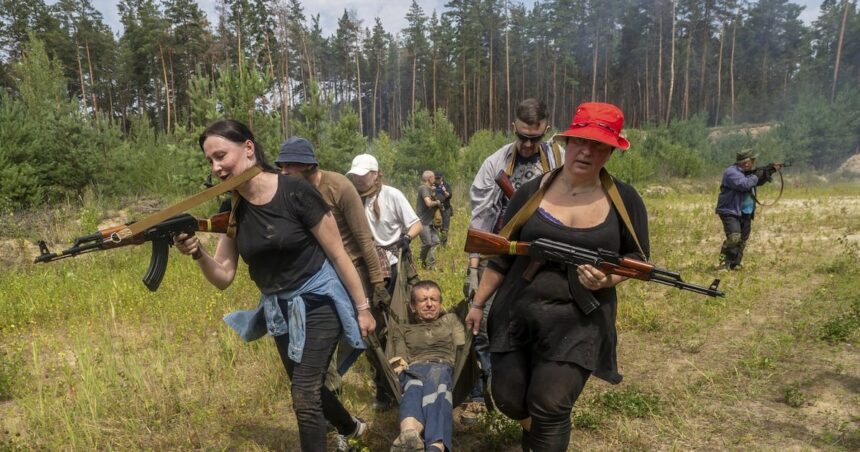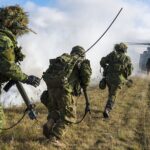I’ve just landed back in Kyiv after three weeks tracking diplomatic movements in Brussels. The city feels different this time – tenser, with security checkpoints multiplying across central districts following what Ukrainian officials are calling a “neutralized threat.”
Last night, Ukraine’s domestic security service (SBU) announced they had killed two Russian agents suspected in the assassination of a high-ranking SBU counterintelligence officer. The killing occurred in broad daylight in central Kyiv, marking an alarming escalation in Russia’s shadow war within Ukrainian territory.
“We tracked them methodically for weeks,” a senior SBU official told me, requesting anonymity due to operational security concerns. “These weren’t just random operatives. They were part of a specialized unit targeting our security infrastructure.“
According to official statements, the Russian agents were eliminated during a special operation in Ukraine’s western Zakarpattia region. The SBU claims the agents were attempting to cross into neighboring Hungary after completing their mission in Kyiv.
What makes this case particularly troubling is the brazenness of the original assassination. Lieutenant Colonel Denys Kireyev was gunned down while walking to his car after lunch at a popular restaurant near Independence Square. Security camera footage I’ve reviewed shows two men approaching Kireyev before firing multiple shots and calmly walking away – suggesting professional training and detailed advance planning.
“This bears all the hallmarks of Russia’s military intelligence directorate operations,” explains Dr. Stefan Wolff, professor of international security at the University of Birmingham. “The GRU has increasingly shifted toward direct action against Ukrainian security personnel, which represents a dangerous new front in this conflict.”
The Ukrainian government has accused Moscow of organizing over 2,500 assassination attempts against Ukrainian officials since Russia’s full-scale invasion began in February 2022. While many targeted strikes have focused on military commanders and political leaders, this recent killing suggests Russia is increasingly targeting the intelligence apparatus itself.
In response to my questions, Kremlin spokesman Dmitry Peskov dismissed Ukraine’s claims as “fantasy” and “another attempt to portray Russia as a terrorist state.” However, evidence collected by both Ukrainian and Western intelligence services suggests an organized campaign of targeted killings.
Walking through Kyiv’s government quarter this morning, I couldn’t help noticing the heightened security presence. Plainclothes officers now patrol major intersections, and vehicle checkpoints have multiplied overnight. For ordinary Kyivans, this represents yet another adjustment to life under constant threat.
“We’ve learned to live with air raid sirens and power outages, and now we must be vigilant about assassins too,” says Olena Kovalenko, 43, who runs a coffee shop near where the SBU officer was killed. “But what choice do we have? This is our reality now.“
The operation to eliminate the suspected killers involved coordination between multiple Ukrainian security agencies. According to the SBU, intelligence indicated the agents planned to escape through Ukraine’s southwestern border after completing their mission. Ukrainian border guards and SBU special forces intercepted them near the border crossing point.
A NATO intelligence official based in Brussels, speaking on condition of anonymity, told me these incidents demonstrate Russia’s continued investment in covert operations despite battlefield setbacks. “Moscow is fighting this war on multiple fronts – conventional military, economic pressure, information warfare, and targeted assassinations. The latter provides asymmetric impact with minimal resource expenditure.”
Documents recovered from the eliminated agents reportedly included detailed surveillance notes on other potential targets within Ukraine’s security establishment. The SBU has declined to provide specific details, citing ongoing operations to dismantle the broader network.
This incident comes amid Ukraine’s continued appeals for additional Western security assistance. Ukrainian President Volodymyr Zelenskyy has repeatedly warned that Russia is adapting its strategy to include more unconventional tactics as conventional military operations face resistance.
“Each such operation against our personnel requires a corresponding response from our partners,” Ukraine’s Foreign Minister told assembled diplomats in Brussels last week, where I observed the proceedings. “Security assistance isn’t just about artillery and air defense – it’s also about counter-intelligence capabilities and protective equipment for our civil servants.”
The United Nations has expressed concern about targeted killings in Ukraine, with Secretary-General António Guterres calling such actions “violations of international humanitarian law.” However, with limited enforcement mechanisms available, Ukrainian officials are focusing on enhancing their defensive capabilities.
For Kyiv’s residents, these developments represent another layer of anxiety in a war that continues to evolve in disturbing directions. As air raid sirens wailed across the city this afternoon, people reflexively checked their phones for alerts while continuing their daily routines – a grim normality that now includes the threat of assassins alongside missiles.
“We are fighting for our very existence as a sovereign nation,” the SBU’s press service stated. “Russia’s resort to targeted killings only strengthens our resolve to defeat their aggression in all its forms.“
As night falls over Kyiv, the city continues its uneasy vigilance – another day in a conflict that increasingly blurs the lines between conventional warfare and shadow operations on the streets of Ukraine’s capital.






